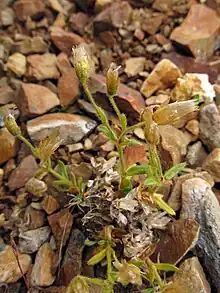| Aleutian mouse-ear chickweed | |
|---|---|
 | |
| Scientific classification | |
| Kingdom: | Plantae |
| Clade: | Tracheophytes |
| Clade: | Angiosperms |
| Clade: | Eudicots |
| Order: | Caryophyllales |
| Family: | Caryophyllaceae |
| Genus: | Cerastium |
| Species: | C. aleuticum |
| Binomial name | |
| Cerastium aleuticum | |
| Synonyms[1] | |
|
Cerastium beeringianum var. aleuticum (Hultén) S.L. Welsh | |
Cerastium aleuticum, common name Aleutian mouse-ear chickweed, is a plant species endemic to the US State of Alaska. It is found only on islands, not on the Alaskan mainland: Aleutian, St. Lawrence, St. Paul, Popof, and Kodiak Islands. It is found on rocky slopes and mountainsides up to an elevation of 700 m.[2]
Cerastium aleuticum is a perennial herb spreading by means of underground rhizomes. Stems are branched, up to 7 cm long, covered with soft hairs. Flowers are single or in groups of 2 or 3, white. Capsules are cylindrical, up to 11 mm long. [2][3][4][5][6]
References
- ↑ The Plant List
- 1 2 Flora of North America v 5
- ↑ Hultén, Oskar Eric Gunnar. 1936. Svensk Botanisk Tidskrift 30(3): 520–521, f. 3a–b.
- ↑ Hultén, E. 1968. Flora of Alaska i–xxi, 1–1008. Stanford University Press, Stanford.
- ↑ Welsh, S. L. 1974. Anderson's Flora of Alaska and Adjacent Parts of Canada i–xvi, 1–724. Brigham Young University Press, Provo.
- ↑ Welsh, Stanley Larson. 1968. Great Basin Naturalist 28(3): 148.
This article is issued from Wikipedia. The text is licensed under Creative Commons - Attribution - Sharealike. Additional terms may apply for the media files.